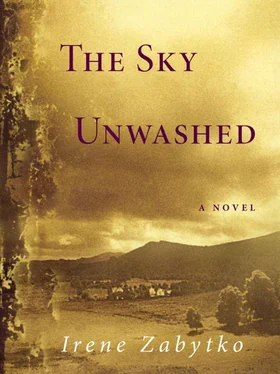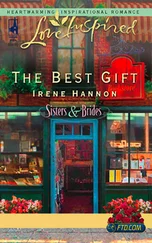She laughed and gently brushed the hay off his mustache. “ Koo-koo ,” she said in a small, high voice.
“ Koo-koo-ri-koo ,” he replied in his loud rooster voice. They both giggled and bumped their foreheads together. The men in the cart guffawed and whistled with their fingers, and the crowd applauded.
Ihor tried to kiss her, but she turned her head. “Not now, wait a little bit longer.” She turned to her audience and shouted, “Please come to the wedding good people of God.”
The crowd cheered and walked behind the wedding party on the path that led directly to the wooden church at the other end of the village.
THE TINNY CHURCH bells rang. Inside the ancient—some said it was built in the seventeenth century—wooden building, the priest patiently waited for the observers to find a place to stand on the floor, since there were no pews. Ihor’s friends made a path through the crowd to the altar. Hanna and Ihor shyly approached the priest standing before the iconostasis. Father Andrei was a young man whose hobnailed work boots, polished for the service, peeked out from beneath his gold brocade vestments. When he wasn’t conducting services, he was a janitor at the Chornobyl plant. He lived with his mother, Paraskevia Volodymyrivna, who never missed a service her son was ministering, even this one, although she had carried a grudge against Evdokia and her family for over a decade. It had something to do with a sick chicken, but no one remembered the details.
Father Andrei looked stern beneath his mop of black karakul hair and behind his full beard. He cleared his throat and began the service once the bride and groom stood on the rushnyk , the embroidered linen wedding cloth. It was no secret that Hanna had hardly ever attended Mass, but she knew the exact moment when she was to walk in a circle three times. Then, both the bride and groom held lit candles that dripped hot beeswax on their hands as they waited for the priest to place the golden crowns on their heads, say the prayers, and then switch their crowns. Ihor and Hanna exchanged rings, and Ihor fumbled with the long silk scarf that was attached to his wrist before winding it around Hanna’s hand so that it was bound together with his own.
“In the sight of God, I pronounce Ihor Hryhorich Bupko married to Hanna, his wife.”
The wedding party congregated outside the church, and everyone wished the bride and groom great happiness. When a battered old black Volga drove up and honked, Ihor and Hanna waved to the crowds and piled into the backseat that was covered with fake leopard skins. They were going to the village center, where Hanna would place her bouquet on the war monument, a new custom practiced throughout the Soviet Union after the Great Patriotic War. Hanna’s parents and several of the younger villagers followed the bride and groom. The older generation, including Evdokia and Oleh, refused to go and watch. “It’s their tradition, not ours,” Evdokia said, and the old men and women nodded.
THE KLUB , A fairly large building, was packed full with guests, some invited and others not. Vodka, made by Hanna’s father from the best potatoes harvested from his own garden, flowed out of barrels. But the bride and groom were toasted first with champagne and then with grandfather Oleh’s bottle of mead, which his feisty bees had helped produce two seasons earlier. He poured the syrupy golden liquid into two shot glasses, one for himself and one for the bride and groom to share, and they held up their glasses in the air. “To the newlyweds,” he said, looking at his glass with great tenderness. “May they be as rich as my wine.” As an afterthought, he raised his glass to the portraits of Lenin and Gorbachev that hung on the wall, then downed the drink, and everyone applauded while Hanna and Ihor shared their measly glass. Oleh grabbed his bottle before anyone else could demand a shot and was hardly seen the rest of the night.
Nobody complained about the quantity or quality of the food: pork kovbasa , chicken, kapusta, pyrohy , borsch, caviar from the Black Sea, and several tortes made in the famous “Kyiv style,” with thin, crisp wafers layered between rich icings of coffee, chocolate and lemon butter. The sweets were arranged next to a huge silver-plated samovar that once belonged to Evdokia’s great-aunt, a serf who had probably stolen it from her master. And Marusia’s beautiful wedding bread was given an honored place in the center of the wedding party table where everyone could see it. She tried not to notice who was eating the bread and how often, but her eyes too frequently drifted to the table.
The small wedding band played a waltz, and Marusia was surprised to see Yurko dancing with Hanna again, for the third time.
“Well, he suddenly likes to dance,” Zosia said.
“Here, darling. Have some torte. This one has walnuts in it….”
“He complains that he’s too tired to go to this and now he’s the belle of the ball.” Zosia sat down, crossed her legs and nervously jiggled her foot.
“Look, they’re finished. Here he comes.”
Yurko wiped his head with a blue cotton handkerchief. His face was flushed from the exertion of the dance and the clamminess of the hall. He smiled brightly at Zosia.
“Having a good time?” Zosia said.
“Not bad. Where are the children?”
“Oh, so now you’re worried about them? I’m surprised you remembered you’re a married man with children.”
“They’re fine, Yurko,” Marusia cut in. “They’re with the other children. See—at that table, eating cake.”
The familiar opening notes of the kryvyi tanet began. “Let’s dance this one,” Zosia commanded.
Yurko took off his suit jacket, half-hung it on a chair and sat down. “I’m a little tired,” he said. He loosened his tie. “It’s too fast for me.”
Zosia jumped up. “Oh, so because I want to dance, you’re tired. But with that whore, you’re ready to join the Bolshoi Ballet.”
“Look, I already danced with you….”
“And with every pretty girl under thirty.”
He stood up. He helped himself to a glass full of carbonated sugar water and downed it. “Remember, Zosen’ka—you wanted me to come to this stupid thing. So I’m here. I don’t care if you ask someone else to dance. Go ahead.”
“I want to dance with you! ”
“Let’s go,” he said wearily. Marusia watched as he and Zosia held hands and rather stiffly whirled out on the dance floor until it was time to switch partners. She turned away when she saw her son paired up with Hanna yet again. Zosia stamped her foot and abruptly left her new dancing partner, one of Ihor’s ushers who was too drunk to notice her departure, delighted to twirl around by himself.
After the dance, Yurko found his wife alone, sulking on a bench against a wall, her head bent down. “I didn’t plan it,” he pleaded. He unbuttoned the top of his shirt and loosened his tie. He sniffed himself and noticed that his shirt was soaked. “I smell worse than a cow in heat. Hardly sexy…” He chuckled.
“You’re so awful to me.” She started to cry without looking at him.
“Oh, come on. You’re acting worse than the children. I swear, you’re such a baby.”
She stood up and grabbed a half-eaten plate of torte that someone had earlier abandoned. “If that’s how you see me… then here.” Zosia dumped the plate on his head and trotted away from him. The sticky icing hung on his damp shirt like brightly colored confetti.
“Well, I guess you’re finished with dessert,” said Father Andrei, who had been leaning against the wall, and witnessing the scene. He handed Yurko a flimsy paper napkin shaped like a triangle.
“My wife is crazy, Father.”
Читать дальше











